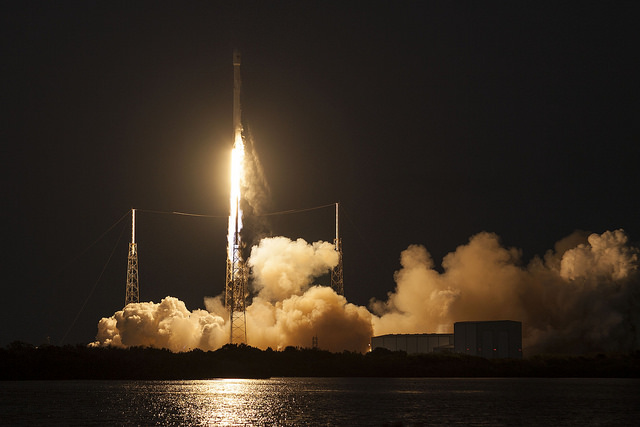Progress M-22M | Photo: NASA
This week we’ve got stories on the latest failed Russian launch, the good news from SpaceX, and me being really happy about Netflix downloads. Add to that our weekly In Case You Missed It segment and our Best of the Rest linkspam, and you’ve got the Sunday roundup for December 4, 2016!
Lost Progress
Six minutes and twenty-two seconds into Thursday’s launch of a Progress resupply ship to the ISS, Roscosmos lost contact. The ship, along with its 5,383lbs of cargo — water, fuel, oxygen, and dry cargo like food and experiments — burned up inn the atmosphere over Siberia. I know we say space is hard, but it does feel like a bit of a pattern these days. The newbies we can understand — when a SpaceX rocket explodes, it’s usually because it’s a situation they haven’t encountered before. And since they’ve only been sending things to the ISS for less than four years, there’s a lot they haven’t encountered before. But Russia’s been at this a long time, so why have they had fifteen rocket failures in six years? Well, according to Jason Davis over at the Planetary Society, it might have something to do with Russia’s economy. He cites a tiny space budget ($20 billion over the next ten years, vs the US’s $19.3 billion NASA budget (projected) for just 2016), aging demographics and a shrinking population, lacking investments in education, and a concomitant shortage of skilled professionals. When you don’t have the money or manpower to do adequate quality control, well, things suffer. The ISS should be fine — they lost three supply runs in under 12 months back in 2014-5, so they know a thing or two about losing cargo runs — but I don’t honestly know if Russia’s space industry is going to be. Check out Jason Davis’s post over at planetary.org for more.

SpaceX RTF NET Dec. 16
Meanwhile things are looking brighter for the US space industry, even under a Trump presidency (so long as the economy holds). SpaceX has officially scheduled a return to flight (RTF) of No Earlier Than (NET) December 16. The launch, if it goes ahead, will carry the first ten of the Iridium satellite constellation’s “Iridium-NEXT” satellites. The network calls for 66 operational satellites, plus an addition six “spares” in orbit and a further nine on the ground. This should be the first of ten SpaceX launches, with plans to have the network fully deployed by late 2017 or early 2018. And just because it’s awesome, here’s a gif of part of the manufacturing process for the Falcon’s oxygen tank:
Oh, and in case you missed it, you can now spec out a rocket at ULA’s website — complete with price tag — in case you’ve been thinking about launching something, anything really, into orbit.
Netflix Downloads
Yes, that’s right ladies and germs, you can now download things from Netflix and watch them offline when you’re in a train, plane, or automobile that doesn’t have the kind of bandwidth you need to feed your binge-watching habits. The company announced Wednesday that — for a small but growing list of shows and movies — you’ll now be able to click “download now to watch offline later.” For now it’s everything Netflix “makes” — Stranger Things, Orange is the New Black, A-Jin, Knights of Sidonia — as well as a growing selection of… whatever they’ve got. Cheers, The Flash, Sword Art Online… something calling itself Aliens on the Moon: The Truth Exposed. You know, whatever. Anyway, it’s going to make taking plane flights in low-quality planes better, that’s for sure. And the best part? It doesn’t cost anything extra. Well played, Netflix, well played indeed.
ICYMI
Just on the off chance you haven’t been following our ever move here at This Week In Tomorrow, here’s what we got up to.
- On Monday I yelled into the void about Trump’s outrage distraction machine
- On Tuesday I talked about another kind of elitism in America (one that’s not limited to the coasts)
- On Wednesday I wrote about artificial gravity and why we haven’t built a space station with it yet
- On Thursday I wrote an update about the Google Lunar X Prize and then forgot to post it, so you’ll get that this week instead, and
- On Friday Elle had to remind us yet again that being criticized for being a woman and being criticized while being a woman are different things.
If you missed any of those (except for Thursday) go back and take a look!
Best of the Rest
Here’s the things we didn’t get to this week!
- Amazon has AI that can run a dog show (or something)
- The sea has pollinators we didn’t know about
- The House Science Committee retweeted a Breitbart Climate Change denial story
- The Satanic Temple says it’ll sue if Texas’s new abortion funeral laws affect one of its members
- Nihonium, Moscovium, Tennessine, and Oganesson are now officially the names of elements 113, 115, 117, and 118
- The UK passed the most invasive snooping law ever seen in a western democracy, and
- India unveiled the world’s largest solar power plant
***
That’s all for today folks, thanks for reading! Except for the very *very* occasional tip (we take Venmo now!), I only get paid in my own (and your) enthusiasm, so please like This Week In Tomorrow on Facebook, follow me on Twitter @TWITomorrow, and tell your friends about the site!
If you like our posts and want to support our site, please share it with others, on Facebook, Twitter, Reddit — anywhere you think people might want to read what we’ve written. If there’s something you think we’ve missed or a story you’d like to see covered, drop us a line! Thanks so much for reading, and have a great week.
***
Richard Ford Burley is a human, writer, and doctoral candidate at Boston College, as well as an editor at Ledger, the first academic journal devoted to Bitcoin and other cryptocurrencies. In his spare time he writes about science, skepticism, feminism, and futurism here at This Week In Tomorrow.


